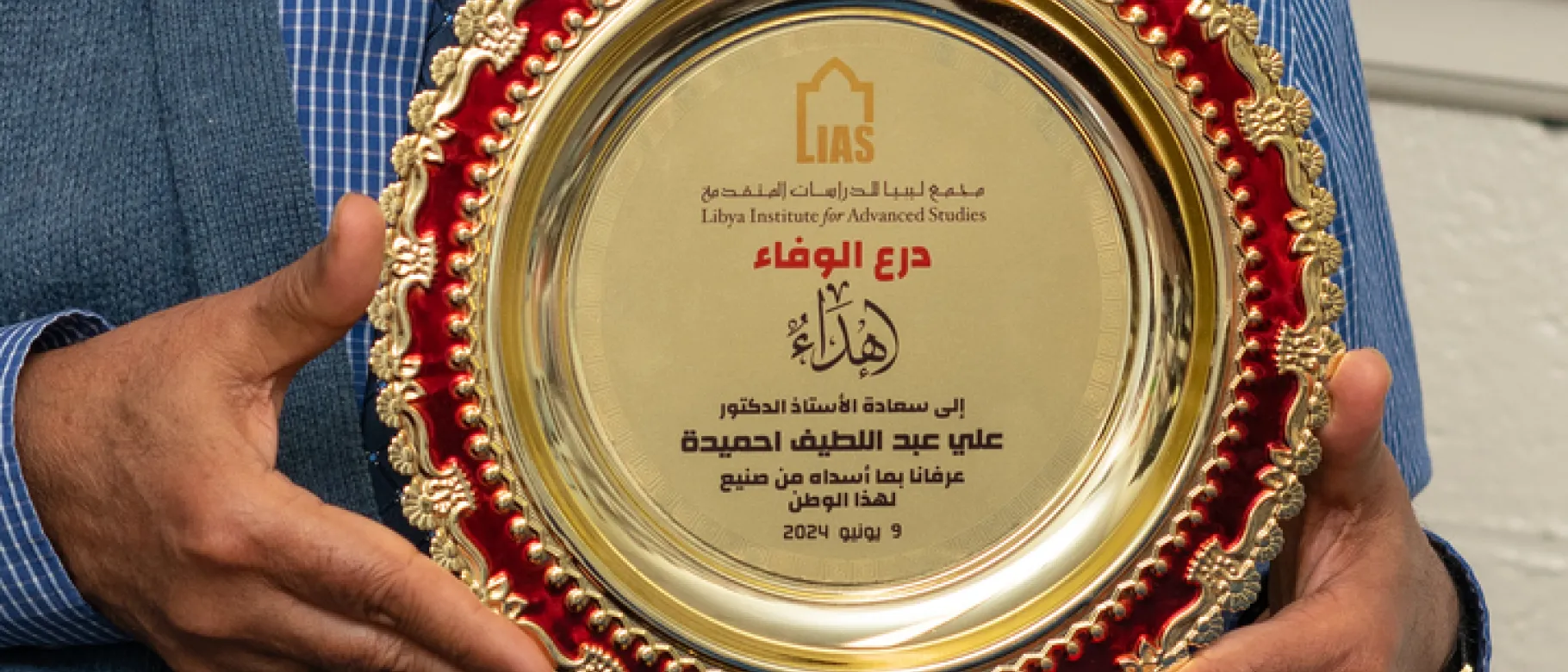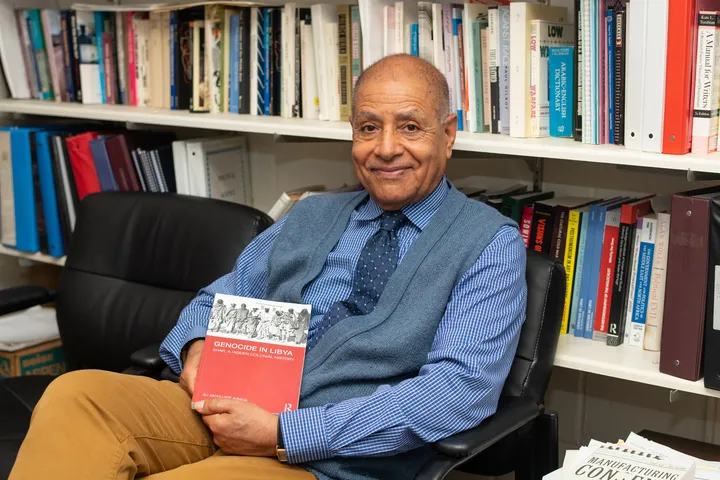UNE Professor Ali Ahmida’s return home to Libya is met with gratitude, recognition

Political Science Professor Ali Ahmida likes to point out to those who visit his University of New England office the small sign on his desk that his children gave him, which looks like a nameplate, but instead says: “I’m kind of a big deal.”
To the laughter that frequently follows this friendly show-and-tell, Ahmida, Ph.D., responds with howls of delight, an unexpected display of joy from someone whose vast scholarship has focused on genocide. However, the continued interest in Ahmida’s most recent book, “Genocide in Libya: Shar, A Hidden Colonial History,” also fills Ahmida with great joy.

Ahmida gave three talks in Libya this summer.
This past summer, when Ahmida returned to his homeland for the first time in 10 years to visit his family in Libya, he was invited to give three talks. And the outpouring of gratitude for the decade he spent researching the book overwhelmed him and proved a more powerful, more personal experience than all the international media coverage the book has received.
“They were really very grateful that I devoted all those years, that my scholarship was about real people and humanity,” said Ahmida, who founded UNE’s political science degree program 24 years ago. “I am American. I’ve spent most of my life in America. But it took a Libyan-American scholar to dedicate all those years to decipher that horrible crime and present it to the world. I told them, ‘You know, this is more important to me than anything else. As a Libyan-American scholar, this is really what gets me going.’”
In “Genocide in Libya,” Ahmida used oral testimony and archival material from survivors to expose the hidden, unreported atrocities that took place in Italian concentration camps in Libya between 1929 and 1934 and killed more than 60,000. The story is nearly a century old, but, Ahmida said, it is still relevant today.
“I call it denial mindset and the burden of history,” Ahmida said. “The Italian fascist government, they tried to pick and choose what to tell and what to teach. I’ve spent almost two decades writing about what happened 90 years ago. But it’s also the silencing, the denial, and the censorship of these atrocities that’s important. So, I try to engage people on why we should pay attention.”
While in Libya, Ahmida spoke at The Peace and Prosperity Party in Tripoli, as well as at the Center of Advanced Libyan Studies at the University of Benghazi, and at the Omar AL Mukhtar University, the third largest university in Libya, which is a country roughly the size of Texas. He gave all three talks in Arabic.
In Tripoli, his talk focused on the denial mindset and the burden of history. In Benghazi, he spoke about researching genocide in Libya and Italy. Afterward, he was presented with a Shield of Distinction that honored him for “his contribution to scholarship and research on modern Libya, with gratitude.”
But it was at the university in Al Bayda where Ahmida got to see first-hand how much his account of the fascist Italian concentration camps in Libya mattered to the working- and middle-class people of Libya.
Ahmida’s talk was titled, “Foundations of Critical Research in the Humanities and Social Sciences.” Here, in eastern Libya, a region that drew Libyan people whose parents and grandparents had been interned in the concentration camps, locals and students stayed for two hours asking questions after Ahmida’s talk.
“It was thrilling, and it was rewarding,” Ahmida said.
They wanted to know how he endured the work of researching such a hideous subject for so many years.
“That talk was the most intimate,” Ahmida said. “There is a need and a purpose and meaning in involving and educating the public, especially the ordinary people who are struggling for democratic rights, for the working class who hope for a better system that ensures the rule of law and democratic rights for everyone.”
After “Genocide in Libya” was published in 2021, Ahmida was awarded the Carl Brown Book Award from the American Association for North African Studies for this contribution.
Today at UNE, Ahmida uses the book in teaching the course “History and Genocide,” a class that fills quickly every year before it’s capped at 25 students.
“Most of them are not even poly-sci (majors),” Ahmida said.
“I try to have a balancing act as an American in one sense, but also as a Libyan American. I try to build bridges and,” he added, “teaching is a way of building bridges. I always try to engage in what’s similar.”